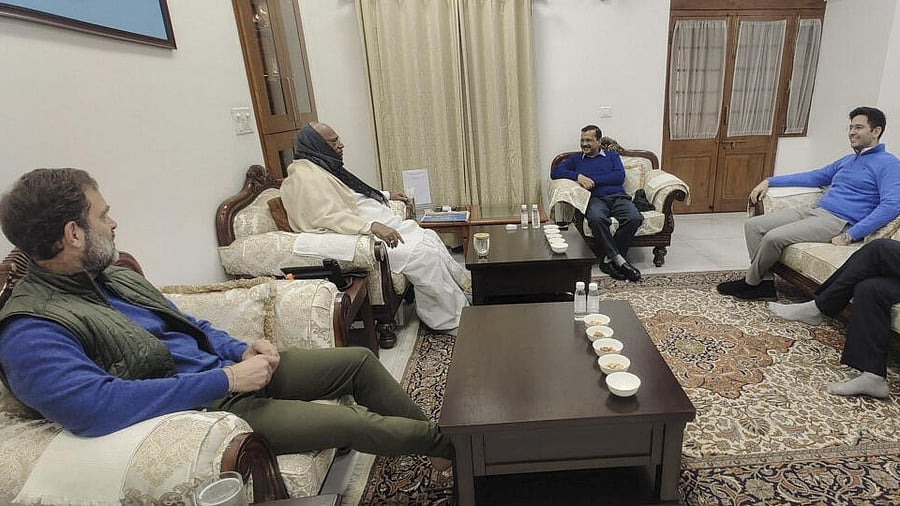
I.N.D.I.A. bloc leaders at a meeting
Credit: PTI Photo
The electoral contest between the Aam Aadmi Party (AAP) and the Congress threatens to splinter the Indian National Inclusive Developmental Alliance (I.N.D.I.A.). To begin with, there was no obvious reason to expect the two parties to enter into an alliance, but going head-on in the impending Delhi Assembly elections doesn’t make a lot of sense either.
First, there was a very real possibility of the Congress and AAP cementing an alliance in Haryana, before the Assembly polls there late last year.. But talks collapsed in an atmosphere of acrimony. Despite all the hoopla about the Congress winning in a canter, it was always going to be a tough race, during which every little bit would count. As we saw then, the Congress lost many seats by narrow margins, though, given AAP’s catastrophic performance, an alliance may not have made a big difference.
However, given that AAP and the Congress could not come to terms in Haryana, an alliance in Delhi was difficult – not impossible. Especially because AAP does not really need the Congress in Delhi, given its recent electoral history. In 2020, the Congress polled 4.26 per cent of the vote to AAP’s 53.57 per cent. In 2015, the Congress polled 9.7 to AAP’s 54.3 per cent. As we know, AAP swept the field both times.
Given the fact that the Delhi race will essentially be between AAP and the Bharatiya Janata Party (BJP), the Congress could have thought long and hard on how to go about preparing for the elections, given that whichever way it played it the broader alliance would have been affected.
The Congress has chosen to play hardball and in the process opened up the fissures within the alliance. Its leadership would have done well to remember that they had been flattened in consecutive elections that they had every chance of winning, going into them. Following these losses, the Congress had been at the business end of criticism within the alliance, including a suggestion from staunch ally and Rashtriya Janata Dal (RJD) chief Lalu Prasad on December 9 that Trinamool Congress (TMC) chief Mamata Banerjee take over the leadership of the group. Others in the alliance concurred.
The fact that the Congress has chosen to launch vitriolic attacks on AAP has hardly soothed tempers within I.N.D.I.A. The most consequential position has been taken RJD leader Tejashwi Yadav, who on January 8 suggested that the Opposition alliance was formed expressly to contest the 2024 general elections and had, in essence, outlived its utility. Clearly, that had not been the idea when the alliance was formed, and that an important player is now writing its obituary, speaks volumes about the mood in the Opposition space.
However, this is not the way that other parties are seeing the picture. Major players in the I.N.D.I.A. camp – including, the Samajwadi Party and the TMC – have pledged support to AAP. It looks like the Congress is being backed into a corner, though Yadav has iterated that his party and the Congress would fight the Bihar elections together later this year.
The Congress, pre-eminently, needs to reassess its options in the current situation. Regardless of the ‘optics’, it must pick the battles it can win and focus on them. This may not look good, especially given a bloated self-image, for the Congress to agree to be junior partners in certain situations; but sometimes it’s the wise move.
It is understandable that Delhi has considerable symbolic value, though its actual political status has been downgraded, but if necessary, the Congress needs to play second fiddle in the larger interest of the alliance. Election after election has humbled the party, but it appears to lack the ability to learn.
Whatever the shortcomings of the commodious alliance forged a year and a half ago, it is still the best political formation to take on the current regime. No one in the Opposition can seriously agree with Yadav about the fate of the I.N.D.I.A. bloc. All that is needed is more good faith and political nous to keep it alive.
(Suhit K Sen is author of ‘The Paradox of Populism: The Indira Gandhi Years, 1966-1977’.)
Disclaimer: The views expressed above are the author's own. They do not necessarily reflect the views of DH.